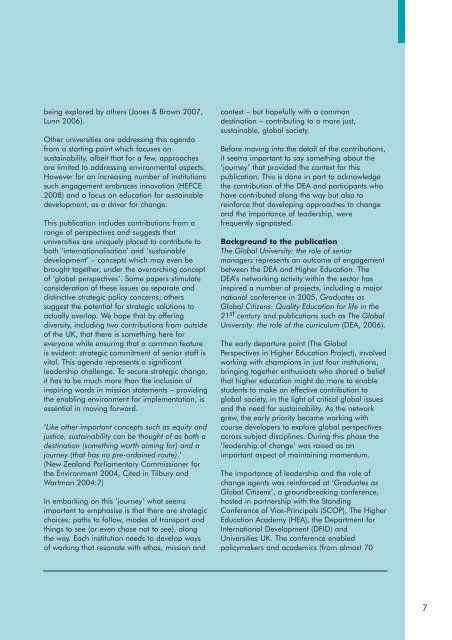HE senior mgrs_Apr18 - Bournemouth University
HE senior mgrs_Apr18 - Bournemouth University
HE senior mgrs_Apr18 - Bournemouth University
Create successful ePaper yourself
Turn your PDF publications into a flip-book with our unique Google optimized e-Paper software.
eing explored by others (Jones & Brown 2007,Lunn 2006).Other universities are addressing this agendafrom a starting point which focuses onsustainability, albeit that for a few, approachesare limited to addressing environmental aspects.However for an increasing number of institutionssuch engagement embraces innovation (<strong>HE</strong>FCE2008) and a focus on education for sustainabledevelopment, as a driver for change.This publication includes contributions from arange of perspectives and suggests thatuniversities are uniquely placed to contribute toboth ‘internationalisation’ and ‘sustainabledevelopment’ – concepts which may even bebrought together, under the overarching conceptof ‘global perspectives’. Some papers stimulateconsideration of these issues as separate anddistinctive strategic policy concerns; otherssuggest the potential for strategic solutions toactually overlap. We hope that by offeringdiversity, including two contributions from outsideof the UK, that there is something here foreveryone while ensuring that a common featureis evident: strategic commitment of <strong>senior</strong> staff isvital. This agenda represents a significantleadership challenge. To secure strategic change,it has to be much more than the inclusion ofinspiring words in mission statements – providingthe enabling environment for implementation, isessential in moving forward.‘Like other important concepts such as equity andjustice, sustainability can be thought of as both adestination (something worth aiming for) and ajourney (that has no pre-ordained route).’(New Zealand Parliamentary Commissioner forthe Environment 2004, Cited in Tilbury andWortman 2004:7)In embarking on this ‘journey’ what seemsimportant to emphasise is that there are strategicchoices: paths to follow, modes of transport andthings to see (or even chose not to see), alongthe way. Each institution needs to develop waysof working that resonate with ethos, mission andcontext – but hopefully with a commondestination – contributing to a more just,sustainable, global society.Before moving into the detail of the contributions,it seems important to say something about the‘journey’ that provided the context for thispublication. This is done in part to acknowledgethe contribution of the DEA and participants whohave contributed along the way but also toreinforce that developing approaches to changeand the importance of leadership, werefrequently signposted.Background to the publicationThe Global <strong>University</strong>: the role of <strong>senior</strong>managers represents an outcome of engagementbetween the DEA and Higher Education. TheDEA’s networking activity within the sector hasinspired a number of projects, including a majornational conference in 2005, Graduates asGlobal Citizens: Quality Education for life in the21 st century and publications such as The Global<strong>University</strong>: the role of the curriculum (DEA, 2006).The early departure point (The GlobalPerspectives in Higher Education Project), involvedworking with champions in just four institutions,bringing together enthusiasts who shared a beliefthat higher education might do more to enablestudents to make an effective contribution toglobal society, in the light of critical global issuesand the need for sustainability. As the networkgrew, the early priority became working withcourse developers to explore global perspectivesacross subject disciplines. During this phase the‘leadership of change’ was raised as animportant aspect of maintaining momentum.The importance of leadership and the role ofchange agents was reinforced at ‘Graduates asGlobal Citizens’, a groundbreaking conference,hosted in partnership with the StandingConference of Vice-Principals (SCOP), The HigherEducation Academy (<strong>HE</strong>A), the Department forInternational Development (DFID) andUniversities UK. The conference enabledpolicymakers and academics (from almost 707





![[2012] UKUT 399 (TCC)](https://img.yumpu.com/51352289/1/184x260/2012-ukut-399-tcc.jpg?quality=85)




![Neutral Citation Number: [2009] EWHC 3198 (Ch) Case No: CH ...](https://img.yumpu.com/50120201/1/184x260/neutral-citation-number-2009-ewhc-3198-ch-case-no-ch-.jpg?quality=85)





